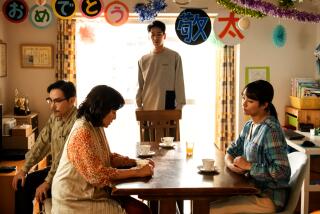Kimura was dragged ashore in time, but it was too late for her son and daughter.
- Share via
On a chilly afternoon in January, 1985, Fumiko Kimura, overwhelmed with grief over the state of her marriage, walked into the ocean from a Santa Monica beach, carrying her two small children with her to their deaths.
It was an attempt at parent-child suicide in a traditional Japanese manner, called oyaku-shinju. Kimura was seen floating off the beach and was dragged ashore in time to be revived, but it was too late for her son, Kazutaka, 4, and daughter, Yuri, 6 months.
Kimura was disturbed, she later explained tearfully, at meeting her husband’s mistress of three years and hearing her complaints, including the mistress’ threat to commit suicide.
Spoke Little English
Although she had lived in the United States 14 years, Kimura, then 32, spoke little English and was described by friends and others as traditionally Japanese in her outlook and life style. She was a devoted mother and submissive wife, sometimes washing the feet of her husband, Itsuroku, part owner of a Japanese restaurant in Chatsworth, when he returned from work to their home in Tarzana.
Originally charged with murder, she pleaded guilty to two counts of voluntary manslaughter and was placed on five years probation and ordered to undergo psychiatric treatment.
Today, Kimura lives in “a cute little house” in another Los Angeles community with her husband, according to Gail Caro, an assistant to Kimura’s lawyer, who sees her frequently.
According to a friend who asked not to be identified, she appears to have a strong marriage since she and her husband reconciled while she was in jail awaiting trial. Her husband now works as a sushi chef at another restaurant. Although she has become somewhat more outgoing, she is still a subservient wife, the friend said.
She teaches piano, crochet and needlepoint to other Japanese and Japanese-American women, and volunteers as an instructor at a Japanese home for the aged and through a church group, Caro said.
She is doing well on probation, said Trula Worthy-Clayton, head of the San Fernando Valley office of the county Probation Department. “She’s in full compliance,” Worthy-Clayton said, and regularly sees a psychiatric social worker “fluent in her language and familiar with her culture” at a county hospital.
“She will be doing that until the therapist tells us she no longer needs it, which could be the whole five years.”
Concentrates on Future
She is still emotionally fragile from the experience, however, and refuses to be interviewed or discuss her life with outsiders, Caro said. “She is adamant that she does not want to draw attention to her past but wants to go on with her life and concentrate on the future.”
Kevin Sliva and Nancy Pontius, the college students who rescued her, continued their studies. Sliva, 21, was graduated from Loyola-Marymount in May with a degree is business administration and works as an accountant for a computer company. Pontius, 21, who helped resuscitate Kimura, transferred from UCLA to the University of Arizona, Sliva said.
More to Read
Sign up for Essential California
The most important California stories and recommendations in your inbox every morning.
You may occasionally receive promotional content from the Los Angeles Times.













